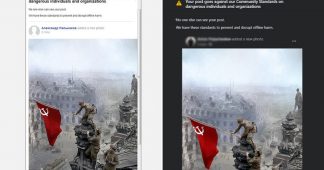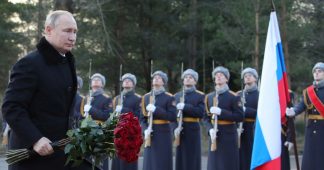Moscow promises Washington a ‘SERIOUS TALK’ about its V-Day message that omits Soviet Union’s role in defeating Nazis
10 May, 2020
Moscow won’t fail to take note of the White House decision to completely exclude the Soviet Union from its message marking Victory in Europe Day, the Foreign Ministry said, calling the act a “distortion” of World War II history.
“The US officials have found neither the courage nor the desire to … do justice to the indisputable role of the Red Army and of the Soviet people, and to the enormous sacrifices they made in the name of humanity,” Russia’s Foreign Ministry said in a statement. It added that ignoring the historical facts due to current political likes or dislikes was unthinkable.
We are planning to have a serious talk on the issue with American officials.
The Soviet Union bore the brunt of fighting Nazi Germany, with at least 27 million of its people killed in WWII. Few families were left untouched, and so celebrations of Victory Day and remembering that war’s tragic toll are still a big deal in Russia.
This is why many reacted with disbelief when media cited a message from the White House that said “on May 8, 1945, America and Great Britain had victory over the Nazis” and failed to even mention their Second World War ally, the USSR. The Twitter post with Donald Trump’s soundbite was soon pelted with tweets that graphically reminded the White House how it was the Red Army that took Berlin.
Russians were, of course, far from the only nation insulted by the White House message, with WWII-era posters showing that the US acknowledged many more allies back in the day.
Utter rubbish..THIS IS AN AMERICAN POSTER FROM 1941. NOW APOLOGISE FOR INSULTING ALL THESE BRAVE AND HONOURABLE COUNTRIES. pic.twitter.com/76smfLdHPe
— Anthony Mortlock (@AnthonyMortlock) May 9, 2020
‘Deep-seated ignorance’ or ‘calculated snub’?
The apparent oversight or blunder does not appear surprising if one takes a closer look at the modern American approach to history, argues Peter Kuznick, professor of History and Director of the Nuclear Studies Institute at American University.
“The problem is that it is what most Americans are taught in the schools and by the media. If you ask Americans who won WWII, most will say it was the US,” Kuznick told RT. He added that many people in the US have a “deep-seated ignorance about all things historical.”
But Jim Jatras, a former US diplomat, believes that the wording of the message was intentional.
“It is a calculated insult, a snub” directed against modern-day Russia, he said. Jatras says that such an approach stems from Washington’s desire to portray itself as the only world leader – and the world’s policeman, who dictates to others what to do.
The US is projecting the modern view of American dominance as the leader of the “progressive world” on history, including that of WWII. The complexities of the war are terra incognita, as far as most Americans are concerned.
“They have a reckless attitude towards insulting other countries,” Jatras adds. The fact that many Americans are enthralled by “fundamental” historical myths perpetuated by the media only makes things worse, Kuznick says.
He adds that these myths particularly include the idea that it was the US that won the war in Europe (American soldiers set foot on the ground in Normandy almost five years after the war began and well after the tide had changed against Germany on the eastern front), and that the American nuclear bombs dropped on Japan helped “save lives” by ending the war (historians still disagree whether the bombings had any military meaning, and they coincided with the Soviet Union’s massive advance on Japan-occupied China, as per an agreement with the US).
Kuznick says the historical myths also put the blame for the ensuing Cold War solely on the Soviet Union. However, rather than being isolated in history textbooks, these misconceptions actually shape modern-day attitudes.
“They are all very dangerous because the way people understand history is going to shape the way they act in the world now and the way they will behave in the future… Perpetuating these kinds of myths is just so irresponsible.”











